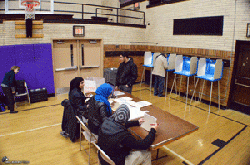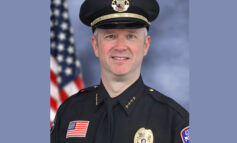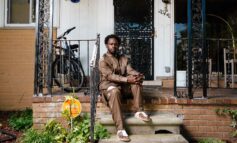DEARBORN — The 2013 General Election turnout in Dearborn was on par with previous municipality races over the past decade, ushering in 18,520 ballots casted–30.2 percent of the City’s 61,295 registered voters.
To break it down by precinct, the voter turnout in the east end, which is home to the largest concentration of Arab Americans in the City, trailed significantly, compared to precincts in the west end. However, the Arab vote on both sides of the City proved to be a significant factor that helped shape the final results.
Prominent precincts in the east end of town, such as McDonald, Lowrey, Woodworth and William Ford, showed a voter turnout of 15-20 percent. In the South end, home to a large Yemeni American community, the turnout at the Salina precinct was 17 percent, on par with the east end precincts.
At larger precincts in west Dearborn, such as Dearborn High, Haigh, First Presbyterian Church and Howard, the voter turnout ranged from 25 to over 30 percent. The majority of the residents on this end of town are non-Arab. However, in recent years the Arab American presence there has grown.
Another determining factor in the race was the absentee ballots. 4,316 absentee votes were cast–amounting to more than 23 percent of the votes.
Interestingly enough, the ranking of the city council candidates varied greatly from one precinct to another. On the east side, Susan Dabaja, Mike Sareini and Tarek Baydoun took the lead at all the precincts. Baydoun, who finished ninth in the race, ranked in the top two in several of the east end precincts. At McDonalds’ two precincts, Baydoun received 433 votes, just three votes behind City Council President-elect Susan Dabaja and more than 200 votes ahead of second place winner Thomas Tafelski.
Tafelski, who is currently council president, was one of the candidates endorsed on the Arab American Political Action Committee’s (AAPAC) slate, which helped him receive a fair amount of votes on that side of town. However, even in those precincts, he trailed 100 to 200 votes behind the Arab American newcomers.
At Lowrey, Dabaja received 293 votes, coming in first. Baydoun came in second, with 269 votes. Third place went to Mike Sareini, with 232 votes. Tafelski was fourth with only 130 votes. Losing candidates Patrick Melton, Kristyn Taylor and Jane Ahern, all endorsed by AAPAC, received respectively 90, 86 and 71 votes at that east end precinct.
Incumbents Robert Abraham and David Bazzy, who are of Arab American decent, received significantly less votes than the Arab American newcomers in the east end, but they still managed to come in fifth and sixth in the total votes from that area. The two candidates did not receive endorsements from AAPAC.
In the east end (precincts 1-12 and 14-21), Dabaja ranked first with 3,614 votes, followed by Sareini with 3,423 votes and Baydoun with 3,313 votes. Tafelski came fourth with 1,953 votes followed by Bazzy, Abraham, and Melton.
At Woodworth’s two precincts, Abraham and Bazzy received 154 votes each, almost half of the 301 votes that Dabaja had nabbed. In contrast, at Howard School on the west side, Abraham received 323 votes, while Bazzy received 339. Dabaja racked up 293 votes at those precincts, which was even less than the seventh placed candidate, Mark Shooshanian, who received 322 votes.
AAPAC Vice President Attorney Ali Hammoud told The Arab American News that some volunteers asked residents to vote only for Arab candidates, which benefited Bazzy and Abraham in the east end and impacted the final results of the election.

“Clearly, the ‘vote Arab’ campaign waged by a certain candidate and the Arab Student Union (ASU) volunteers helped Bazzy and Abraham in the east, while AAPAC slate helped Tafelski and Melton in the same area,” he said. “However, AAPAC’s help was not sufficient for Melton to unseat incumbent Mark Shooshanian, who won the 7th seat on the council by a difference of only 386 votes ahead of Melton. If more Arab voters followed the AAPAC slate instead of the ‘vote Arab’ voices, most likely Melton would have defeated Shooshanian, and Abraham and Bazzy may have fared worse in the east, possibly changing the entire outcome of the race, and helping elect Baydoun to the council.”
As evidenced by the final results, a high ranking candidate must appeal, to a certain extent, to all voters across the City. Dabaja, for example, dominated in the east end and did fairly well in the west, mostly placing in the top seven. She even prevailed with the absentee ballots, receiving close to 2,000 votes, coming in third, behind Tafelski and Abraham.
Baydoun, on the other hand, received only 808 absentee votes and did relatively poorly on the west side, missing out on a city council seat.
The Mayor’s endorsement to newcomers Dabaja and Sareini, along with incumbents Abraham, Bazzy, Shooshanian and Brian O’Donnell may have also bumped their numbers in the west end.
However, Tafelski ranked first in total voted in the west end (precincts 22-50) with 4,757 votes, despite not being endorsed by Mayor O’Reilly, who promoted his slate through several mailings. Dabaja and Sareini ranked 7th and 9th respectively in the same west end precincts.
Mallak Beydoun, Dabaja’s campaign manager, said she aimed to reach out to all of the City’s voters.
“We ran our campaign in such a way that Susan could appeal to voters all over Dearborn; east and west end alike, as well as senior citizens who vote by absentee,” Mallak says. “The east end, where Susan practices law, is her base. The west end is fairly new to her, so we were very proud with the numbers. She is a new candidate, whereas other running incumbents have been on the council for up to 12 years and voters were more familiar with them.”

She added that community candidates cannot count on one group of voters to secure a win.
“You can’t win on an Arab vote alone. You have to run a comprehensive campaign that includes all ends of the City,” she said.
While Tarek Baydoun acknowledges his weak performance in the west, he also says that his campaign was expecting a higher Arab American turnout from all sides of the City.
“I was expecting a higher Arab American turnout, at least by double the amount,” Baydoun told The Arab American News. “I had a lot of challenges [in the west side], one of which was having an Arab name and being younger. There were 14 candidates, and it’s hard to get voters to look at you when you have five incumbents and two other candidates with less Arab sounding names, who were also endorsed by the Mayor.”
Baydoun added that some people based their votes on age, gender and ethnicity, but he tried to reach out to non-Arab voters, knocking on over 1,000 doors and sending out flyers.
Baydoun notes that, despite his disappointment with the Arab American voter turnout, the number of Arab American residents all over the City has increased since the last elections, along with the number and percentage of Arab American voters.
AAPAC president Mariam Bazzi says the organization did their part to raise awareness prior to Election Day, however it didn’t seem like the community came out in droves.
“I think the turnout could have been better, but people need to remember that this was a local election year, not a presidential race, so it was expected,” Bazzi says. “I do think it was very important for Arab Americans to come out and vote for our slate, because there were three Arab American candidates on there, but I just don’t think the turnout was as strong as it could have been. I think the community really needs to sit down and think about what our goals and priorities need to be in the future.”
The community’s turnout may not have been as high as candidates and community leaders were anticipating, but at the end of the day, it made a difference. It was one of the major factors that helped Dabaja to the council presidency and Sareini to a respectable third place finish.
While Arab American political participation remains a work-in-progress, Mallak Beydoun told The Arab American News that ethnicity no longer plays a major role in a voter’s decision. She cited recent local and national elections, including Mike Duggan’s victory in Detroit’s mayoral race.
“The transition is here. The majority of voters are no longer looking at ethnicity; they are electing people they feel will help move their cities forward, regardless of their background.”






Leave a Reply